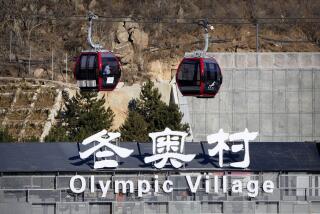China Has ‘Kindergarten’ for Its Winter Sport Athletes
- Share via
HARBIN, China — The sign outside says Sports Kindergarten, but inside the low, white building, children ages four through six are being groomed for Olympic glory on ice.
“I want to grow up and be in the Olympics. I can get the gold medal,” said Song Tao, 6, one of 95 children at the Daowei District Sports Kindergarten in the capital of Heilongjiang province.
If Song fulfills her dream, she will be following in the footsteps of Heilongjiang native Li Yan, who brought home a gold medal from the 1988 Winter Olympics in Calgary for the 1,000-meter women’s speed skating event. The event was a demonstration sport and does not count in the official medal standings.
China wants to become a major world sports power by the year 2000, when Beijing may be a candidate to stage the summer games, and Chinese athletes already are among the world’s best in gymnastics, volleyball, table tennis and badminton.
However, they lag behind in winter sports. China sent only speed and figure skaters and cross country skiers to the Calgary games, only the third winter Olympics it has attended.
The trainers at the Harbin sports kindergarten say they are playing a small role in making China “a dragon” in winter sports, and they are determined to make their school the nation’s leader in turning out winter sports stars.
“Our kindergarten is the tail of the dragon,” said Yang Xu, director of the Daowei District Sports Committee.
China has numerous schools to train the athletically gifted, but the kindergarten is the only one in Heilongjiang that offers training in a variety of winter sports, including speed and figure skating and ice hockey. Other winter sports kindergartens concentrate on only one event, Yang said.
Students at the Daowei school are monitored to see which sport they excel in and training then concentrates on that event.
Already, the pupils have taken home trophies in provincial competitions, which means they are among the nation’s best since no other province matches Heilongjiang, China’s northernmost province, in winter sports, Yang said.
The school was established in 1986 and has had no lack of pupils despite its $13 annual tuition, which is more than half the average worker’s monthly salary.
When the school opened, 200 students applied for 70 spaces. Last year, more than 200 applied for only 30 openings.
Only those who can pass the school’s strict physical examination are accepted. Applicants have to run 33 yards in less than 10 seconds and jump farther than 31 inches and higher than 8 inches.
“On exam day, the parents are so nervous,” Yang said, telling of distraught parents who told him: “At home he runs so fast, but here he’s shy and won’t run.”
The teachers also look at a child’s physique and that of his parents. Candidates who are too short or have a long body and short legs are rejected.
The school already has graduated 30 students, 24 of whom went on to Harbin’s athletic schools where they will train for a career in athletics.
School administrators have high hopes for the school, but it suffers from lack of funding and facilities.
The students have only 90 minutes of on-ice instruction each day in the winter because the outdoor rink is also used for district sports events.
Harbin has two of China’s six indoor ice rinks, but they are not in the Daowei district. Students at the kindergarten can practice only two or three months a year on the rink in front of their school.
Requests for funding to build an indoor rink have not been successful, Yang said.
Similarly, school officials want to expand the five-room schoolhouse and build a playground and garden, but there is no land or money, said Zhao Shiliang, director of the kindergarten.
The school gives each child a pair of figure skates, which cost about $27, but school administrators say the students should have other equipment if they are to be properly trained.
They would like such things as a television set, videocassette recorder and TV camera so the children can watch their own performances and those of other athletes.
They also want to buy a cassette player to teach music, which is important to figure skaters.
“We want to break the idea that athletes are empty in the head,” Zhao said. “If a figure skater doesn’t understand music, how can he be creative?”
More to Read
Sign up for Essential California
The most important California stories and recommendations in your inbox every morning.
You may occasionally receive promotional content from the Los Angeles Times.










